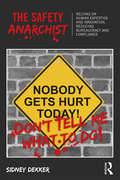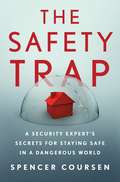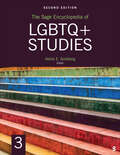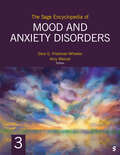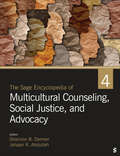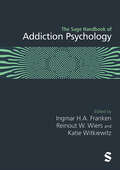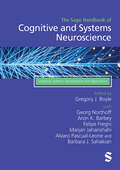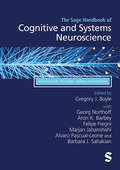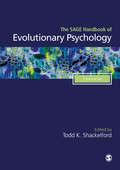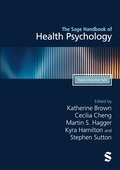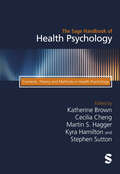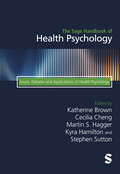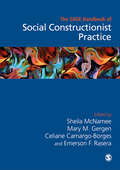- Table View
- List View
The Sadomasochistic Perversion: The Entity and the Theories
by Franco De MasiThis book examines the terminology used in the analysis of sadomasochism, surveys extensively, and in detail, the theories of other psychoanalysts, and explores the relationship between sadomasochism and depression; its relationship to psychosis, borderline states, and many other conditions.
The Safety Anarchist: Relying on human expertise and innovation, reducing bureaucracy and compliance
by Sidney DekkerWork has never been as safe as it seems today. Safety has also never been as bureaucratized as it is today. Over the past two decades, the number of safety rules and statutes has exploded, and organizations themselves are creating ever more internal compliance requirements. At the same time, progress on safety has slowed to a crawl. Many incident- and injury rates have flatlined. Worse, excellent safety performance on low-consequence events tends to increase the risk of fatalities and disasters. Bureaucracy and compliance now seem less about managing the safety of the workers we are responsible for, and more about managing the liability of the people they work for. We make workers do a lot that does nothing to improve their success locally. Paradoxically, such tightening of safety bureaucracy robs us of exactly the source of human insight, creativity and resilience that can tell us how success is actually created, and where the next accident may well happen. It is time for Safety Anarchists: people who trust people more than process, who rely on horizontally coordinating experiences and innovations, who push back against petty rules and coercive compliance, and who help recover the dignity and expertise of human work.
The Safety Trap: A Security Expert's Secrets for Staying Safe in a Dangerous World
by Spencer CoursenThreat management expert Spencer Coursen offers proactive strategies to protect yourself and your loved ones in the event of hostile encounters and emergency situations in The Safety Trap: A Security Expert’s Secrets for Staying Safe in a Dangerous World.Despite what the news and social media would have you believe, we have never lived in a safer time than we are now. Unfortunately, we live under a false sense of security enforced by authorities that only alleviates fears without reducing risk. We have placed our personal safety, and our responsibilities of guarding it, into the hands of people trained only to respond to crises, not actively prevent them. Our blind faith in institutions to protect us has only dulled our natural survival instincts. The truth is that when we feel safest is actually when we are in the most danger.This is the paradox of The Safety Trap.When you don’t expect danger, you simply fail to see the signs that something bad is about to happen. But the signs are always there, and staying safe is about training yourself to see them. In easy-to-implement methods of maintaining vigilance, assessing risk, and taking preventative measures, you’ll discover how to be alert without anxiety and know how to best protect and defend yourself on the job, in school, in public places, at home, and online.With Coursen’s simple formula of Awareness + Preparation = Safety as your guide—as well as real world examples of managing threats—you will learn how to develop the skills and confidence to reclaim your own security and avoid The Safety Trap.
The Sage Encyclopedia of LGBTQ+ Studies, 2nd Edition
by Abbie E. GoldbergThe SAGE Encyclopedia of LGBTQ Studies, 2nd Edition is aimed at students and educators interested in an interdisciplinary perspective on LGBTQ issues. It examines and provides understandings of the lives and experiences of LGBTQ individuals, with attention to the contexts and forces that shape their world. The volume addresses questions such as: What are the key theories used to understand variations in sexual orientation and gender identity? What does LGBTQ+ affirmative therapy look like? How have anti-LGBTQ ballot measures affected LGBTQ people? What are LGBTQ+ people’s experiences during COVID-19? How were LGBTQ+ people impacted by the Trump administration? What is life like for LGBTQ+ people living outside the United States? This encyclopedia looks at LGBTQ issues and identity primarily through the lenses of psychology, human development, and sociology, while emphasizing queer, feminist, and ecological perspectives on this topic. Entries are written by top researchers and clinicians across multiple fields—psychology, human development, gender/queer studies, sexuality studies, social work, nursing, cultural studies, education, family studies, medicine, public health, and sociology.
The Sage Encyclopedia of LGBTQ+ Studies, 2nd Edition
by Abbie E. GoldbergThe SAGE Encyclopedia of LGBTQ Studies, 2nd Edition is aimed at students and educators interested in an interdisciplinary perspective on LGBTQ issues. It examines and provides understandings of the lives and experiences of LGBTQ individuals, with attention to the contexts and forces that shape their world. The volume addresses questions such as: What are the key theories used to understand variations in sexual orientation and gender identity? What does LGBTQ+ affirmative therapy look like? How have anti-LGBTQ ballot measures affected LGBTQ people? What are LGBTQ+ people’s experiences during COVID-19? How were LGBTQ+ people impacted by the Trump administration? What is life like for LGBTQ+ people living outside the United States? This encyclopedia looks at LGBTQ issues and identity primarily through the lenses of psychology, human development, and sociology, while emphasizing queer, feminist, and ecological perspectives on this topic. Entries are written by top researchers and clinicians across multiple fields—psychology, human development, gender/queer studies, sexuality studies, social work, nursing, cultural studies, education, family studies, medicine, public health, and sociology.
The Sage Encyclopedia of Mood and Anxiety Disorders
by Amy Wenzel Dara Gail Friedman-WheelerCourses in psychological distress and disorders are among the most popular courses in psychology programs, and mood and anxiety disorders are among the most prevalent disorders covered in these classes and encountered by mental health professionals. Although there are books on mood and anxiety disorders, on particular aspects of them, and on their presentation in specific populations, such works do not provide students new to the field with a comprehensive and accessible ready reference for understanding these disorders with respect to their phenomenology, etiology, and treatment, and through an inclusive lens that consistently considers how these symptoms appear and are construed across cultures, addressing societal factors such as race, culture, equity, and oppression. It is hoped that The SAGE Encyclopedia of Mood and Anxiety Disorders will fill this gap, allowing students and other interested readers to become familiar with past and current approaches and theories and to enhance their understanding of the sociocultural factors that affect how we discuss, approach, and treat these types of psychological distress. As such, consideration of sociocultural factors will infuse the three-volume set. The encyclopedia will consist of approximately 450 entries (essays), arranged alphabetically within three volumes.
The Sage Encyclopedia of Mood and Anxiety Disorders
by Amy Wenzel Dara Gail Friedman-WheelerCourses in psychological distress and disorders are among the most popular courses in psychology programs, and mood and anxiety disorders are among the most prevalent disorders covered in these classes and encountered by mental health professionals. Although there are books on mood and anxiety disorders, on particular aspects of them, and on their presentation in specific populations, such works do not provide students new to the field with a comprehensive and accessible ready reference for understanding these disorders with respect to their phenomenology, etiology, and treatment, and through an inclusive lens that consistently considers how these symptoms appear and are construed across cultures, addressing societal factors such as race, culture, equity, and oppression. It is hoped that The SAGE Encyclopedia of Mood and Anxiety Disorders will fill this gap, allowing students and other interested readers to become familiar with past and current approaches and theories and to enhance their understanding of the sociocultural factors that affect how we discuss, approach, and treat these types of psychological distress. As such, consideration of sociocultural factors will infuse the three-volume set. The encyclopedia will consist of approximately 450 entries (essays), arranged alphabetically within three volumes.
The Sage Encyclopedia of Multicultural Counseling, Social Justice, and Advocacy
by Shannon B. Dermer Jahaan R. AbdullahSince the late 1970s, there has been an increase in the study of diversity, inclusion, race, and ethnicity within the field of counseling. The SAGE Encyclopedia of Multicultural Counseling, Social Justice, and Advocacy will comprehensively synthesize a wide range of terms, concepts, ideologies, groups, and organizations through a diverse lens. This encyclopedia will include entries on a wide range of topics relative to multicultural counseling, social justice and advocacy, and the experiences of diverse groups. The encyclopedia will consist of approximately 600 signed entries, arranged alphabetically within four volumes.
The Sage Encyclopedia of Multicultural Counseling, Social Justice, and Advocacy
by Shannon B. Dermer Jahaan R. AbdullahSince the late 1970s, there has been an increase in the study of diversity, inclusion, race, and ethnicity within the field of counseling. The SAGE Encyclopedia of Multicultural Counseling, Social Justice, and Advocacy will comprehensively synthesize a wide range of terms, concepts, ideologies, groups, and organizations through a diverse lens. This encyclopedia will include entries on a wide range of topics relative to multicultural counseling, social justice and advocacy, and the experiences of diverse groups. The encyclopedia will consist of approximately 600 signed entries, arranged alphabetically within four volumes.
The Sage Handbook of Addiction Psychology
by Katie Witkiewitz Reinout W. Wiers Ingmar H.A. FrankenThe Sage Handbook of Addiction Psychology presents a comprehensive overview of the state of the science behind the psychology of addiction, offering a crucial resource for psychologists engaged in both research and practice. The Handbook features a distinguished international group of contributors, all renowned specialists in their respective fields and emphasizes a forward-looking perspective. Chapters delve into psychological theories of addiction and evidence-based addiction treatment, offering practical insights on the intricacies of addiction psychology. The handbook takes a holistic approach by incorporating neighbouring fields traditionally outside of psychology; it explores economics, genetics, public health, neurobiology, computer science, and sociology, recognizing that psychology and individual-centered perspectives are just one facet of addiction. This multifaceted approach ensures that readers gain a broad understanding of the psychology of addiction, fostering a comprehensive and nuanced comprehension of this complex subject. With Substance Use Disorders ranking among the most prevalent mental health concerns globally, this handbook, designed from the ground up for students and researchers, is an essential resource for those seeking a deep understanding of the field of addiction psychology. Part 1. Background, including history and epidemiology. PART 2. Vulnerability, including psychological, environmental, and biological factors. PART 3 Interventions PART 4 Specific addictions PART 5 Future directions
The Sage Handbook of Addiction Psychology
by Katie Witkiewitz Reinout W. Wiers Ingmar H.A. FrankenThe Sage Handbook of Addiction Psychology presents a comprehensive overview of the state of the science behind the psychology of addiction, offering a crucial resource for psychologists engaged in both research and practice. The Handbook features a distinguished international group of contributors, all renowned specialists in their respective fields and emphasizes a forward-looking perspective. Chapters delve into psychological theories of addiction and evidence-based addiction treatment, offering practical insights on the intricacies of addiction psychology. The handbook takes a holistic approach by incorporating neighbouring fields traditionally outside of psychology; it explores economics, genetics, public health, neurobiology, computer science, and sociology, recognizing that psychology and individual-centered perspectives are just one facet of addiction. This multifaceted approach ensures that readers gain a broad understanding of the psychology of addiction, fostering a comprehensive and nuanced comprehension of this complex subject. With Substance Use Disorders ranking among the most prevalent mental health concerns globally, this handbook, designed from the ground up for students and researchers, is an essential resource for those seeking a deep understanding of the field of addiction psychology. Part 1. Background, including history and epidemiology. PART 2. Vulnerability, including psychological, environmental, and biological factors. PART 3 Interventions PART 4 Specific addictions PART 5 Future directions
The Sage Handbook of Cognitive and Systems Neuroscience: Cognitive Systems, Development and Applications
by Alvaro Pascual-Leone Georg Northoff Barbara J. Sahakian Felipe Fregni Marjan Jahanshahi Aron K. Barbey Gregory J. BoyleCognitive neuroscience is the interdisciplinary study of how cognitive and intellectual functions are processed and represented within the brain, which is critical to building understanding of core psychological and behavioural processes such as learning, memory, behaviour, perception, and consciousness. Understanding these processes not only offers relevant fundamental insights into brain-behavioural relations, but may also lead to actionable knowledge that can be applied in the clinical treatment of patients with various brain-related disabilities. This Handbook examines complex cognitive systems through the lens of neuroscience, as well as providing an overview of development and applications within cognitive and systems neuroscience research and beyond. Containing 35 original, state of the art contributions from leading experts in the field, this Handbook is essential reading for researchers and students of cognitive psychology, as well as scholars across the fields of neuroscientific, behavioural and health sciences. Part 1: Attention, Learning and Memory Part 2: Language and Communication Part 3: Emotion and Motivation Part 4: Social Cognition Part 5: Cognitive Control and Decision Making Part 6: Intelligence
The Sage Handbook of Cognitive and Systems Neuroscience: Cognitive Systems, Development and Applications
by Alvaro Pascual-Leone Georg Northoff Barbara J. Sahakian Felipe Fregni Marjan Jahanshahi Aron K. Barbey Gregory J. BoyleCognitive neuroscience is the interdisciplinary study of how cognitive and intellectual functions are processed and represented within the brain, which is critical to building understanding of core psychological and behavioural processes such as learning, memory, behaviour, perception, and consciousness. Understanding these processes not only offers relevant fundamental insights into brain-behavioural relations, but may also lead to actionable knowledge that can be applied in the clinical treatment of patients with various brain-related disabilities. This Handbook examines complex cognitive systems through the lens of neuroscience, as well as providing an overview of development and applications within cognitive and systems neuroscience research and beyond. Containing 35 original, state of the art contributions from leading experts in the field, this Handbook is essential reading for researchers and students of cognitive psychology, as well as scholars across the fields of neuroscientific, behavioural and health sciences. Part 1: Attention, Learning and Memory Part 2: Language and Communication Part 3: Emotion and Motivation Part 4: Social Cognition Part 5: Cognitive Control and Decision Making Part 6: Intelligence
The Sage Handbook of Cognitive and Systems Neuroscience: Neuroscientific Principles, Systems and Methods
by Alvaro Pascual-Leone Georg Northoff Barbara J. Sahakian Felipe Fregni Marjan Jahanshahi Aron K. Barbey Gregory J. BoyleCognitive neuroscience is the interdisciplinary study of how cognitive and intellectual functions are processed and represented within the brain, which is critical to building understanding of core psychological and behavioural processes such as learning, memory, behaviour, perception, and consciousness. Understanding these processes not only offers relevant fundamental insights into brain-behavioural relations, but may also lead to actionable knowledge that can be applied in the clinical treatment of patients with various brain-related disabilities. This Handbook focusses on the foundational principles, methods, and underlying systems in cognitive and systems neuroscience, as well as examining cutting-edge methodological advances and innovations. Containing 34 original, state of the art contributions from leading experts in the field, this Handbook is essential reading for researchers and students of cognitive psychology, as well as scholars across the fields of neuroscientific, behavioural and health sciences. Part 1: Background Considerations Part 2: Neuroscientific Substrates and Principles Part 3: Neuroanatomical Brain Systems Part 4: Neural Dynamics and Processes Part 5: Sensory-Perceptual Systems and Cognition Part 6: Methodological Advances
The Sage Handbook of Cognitive and Systems Neuroscience: Neuroscientific Principles, Systems and Methods
by Alvaro Pascual-Leone Georg Northoff Barbara J. Sahakian Felipe Fregni Marjan Jahanshahi Aron K. Barbey Gregory J. BoyleCognitive neuroscience is the interdisciplinary study of how cognitive and intellectual functions are processed and represented within the brain, which is critical to building understanding of core psychological and behavioural processes such as learning, memory, behaviour, perception, and consciousness. Understanding these processes not only offers relevant fundamental insights into brain-behavioural relations, but may also lead to actionable knowledge that can be applied in the clinical treatment of patients with various brain-related disabilities. This Handbook focusses on the foundational principles, methods, and underlying systems in cognitive and systems neuroscience, as well as examining cutting-edge methodological advances and innovations. Containing 34 original, state of the art contributions from leading experts in the field, this Handbook is essential reading for researchers and students of cognitive psychology, as well as scholars across the fields of neuroscientific, behavioural and health sciences. Part 1: Background Considerations Part 2: Neuroscientific Substrates and Principles Part 3: Neuroanatomical Brain Systems Part 4: Neural Dynamics and Processes Part 5: Sensory-Perceptual Systems and Cognition Part 6: Methodological Advances
The Sage Handbook of Evolutionary Psychology: Applications Of Evolutionary Psychology
by Todd K. ShackelfordEvolutionary psychology is an important and rapidly expanding area in the life, social, and behavioral sciences, and this Handbook represents the most comprehensive and up-to-date reference text in the field today. Over three volumes, the Handbook provides a rich overview of the most important theoretical and empirical work in the field. Chapters cover a broad range of topics, including theoretical foundations, the integration of evolutionary psychology with other life, social, and behavioral sciences, as well as with the arts and the humanities, and the increasing power of evolutionary psychology to inform applied fields, including medicine, psychiatry, law, and education. Each of the volumes has been carefully curated to have a strong thematic focus, covering: - The foundations of evolutionary psychology; - The integration of evolutionary psychology with other disciplines, and; - The applications of evolutionary psychology. The SAGE Handbook of Evolutionary Psychology is an essential resource for researchers, graduate students, and advanced undergraduate students in all areas of psychology, and in related disciplines across the life, social, and behavioral sciences.
The Sage Handbook of Evolutionary Psychology: Applications Of Evolutionary Psychology
by Todd K. ShackelfordEvolutionary psychology is an important and rapidly expanding area in the life, social, and behavioral sciences, and this Handbook represents the most comprehensive and up-to-date reference text in the field today. Over three volumes, the Handbook provides a rich overview of the most important theoretical and empirical work in the field. Chapters cover a broad range of topics, including theoretical foundations, the integration of evolutionary psychology with other life, social, and behavioral sciences, as well as with the arts and the humanities, and the increasing power of evolutionary psychology to inform applied fields, including medicine, psychiatry, law, and education. Each of the volumes has been carefully curated to have a strong thematic focus, covering: - The foundations of evolutionary psychology; - The integration of evolutionary psychology with other disciplines, and; - The applications of evolutionary psychology. The SAGE Handbook of Evolutionary Psychology is an essential resource for researchers, graduate students, and advanced undergraduate students in all areas of psychology, and in related disciplines across the life, social, and behavioral sciences.
The Sage Handbook of Health Psychology
by Katherine Brown Martin Hagger Stephen Sutton Kyra Hamilton Cecilia ChengThe field of health psychology has undergone transformative growth and development over the past 20 years This two-volume set captures the evolution of the field, providing a comprehensive and up-to-date reference for researchers, practitioners, and students. Each volume delves into critical aspects of health psychology, from foundational theories and methods to practical applications and interventions. This set is essential reading for those seeking to understand and apply health psychology principles to improve health and wellbeing outcomes. Volume One: Contexts, Theory, and Methods in Health Psychology The Sage Handbook of Health Psychology, 2e Volume One: Contexts, Theory and Methods in Health Psychology is focused on the foundational contexts, theories, and methods that underpin health psychology today. The Handbook covers diverse perspectives, including socio-political, cultural, and ethical issues, and provides an in-depth exploration of biological health psychology, theories of health-related behavior, and advanced research methodologies. Essential for postgraduate students, researchers, and practitioners, this Handbook offers a comprehensive overview of the current state of research and knowledge in health psychology. Section One: Contexts and Perspectives Section Two: Theories of Health-Related Behavior Section Three: Biological Health Psychology: Theories and Approaches Section Four: Methods and Measurement in Health Psychology Volume Two: Issues, Debates and Applications of Health Psychology The Sage Handbook of Health Psychology, 2e Volume Two: Issues, Debates andApplications of Health Psychology covers the practical applications of health psychology, addressing intervention development, health improvement strategies, mental health and wellbeing, health protection, and the integration of health psychology into policy and professional practice. With contributions from leading experts, this is an indispensable resource for those looking to apply health psychology principles to real-world challenges. This Handbooks is a must-read for postgraduate students, researchers, and practitioners aiming to improve health and wellbeing outcomes through evidence-based practices. Section One: Issues and Debates in Health Psychology Section Two: Intervention Development Approaches Section Three: Health Improvement Interventions and Preventive Behaviors Section Four: Improving Mental Health and Wellbeing Section Five: Health Protection Interventions and Long-term Conditions Section Six: Health Psychology in Practice
The Sage Handbook of Health Psychology
by Katherine Brown Martin Hagger Stephen Sutton Kyra Hamilton Cecilia ChengThe field of health psychology has undergone transformative growth and development over the past 20 years This two-volume set captures the evolution of the field, providing a comprehensive and up-to-date reference for researchers, practitioners, and students. Each volume delves into critical aspects of health psychology, from foundational theories and methods to practical applications and interventions. This set is essential reading for those seeking to understand and apply health psychology principles to improve health and wellbeing outcomes. Volume One: Contexts, Theory, and Methods in Health Psychology The Sage Handbook of Health Psychology, 2e Volume One: Contexts, Theory and Methods in Health Psychology is focused on the foundational contexts, theories, and methods that underpin health psychology today. The Handbook covers diverse perspectives, including socio-political, cultural, and ethical issues, and provides an in-depth exploration of biological health psychology, theories of health-related behavior, and advanced research methodologies. Essential for postgraduate students, researchers, and practitioners, this Handbook offers a comprehensive overview of the current state of research and knowledge in health psychology. Section One: Contexts and Perspectives Section Two: Theories of Health-Related Behavior Section Three: Biological Health Psychology: Theories and Approaches Section Four: Methods and Measurement in Health Psychology Volume Two: Issues, Debates and Applications of Health Psychology The Sage Handbook of Health Psychology, 2e Volume Two: Issues, Debates andApplications of Health Psychology covers the practical applications of health psychology, addressing intervention development, health improvement strategies, mental health and wellbeing, health protection, and the integration of health psychology into policy and professional practice. With contributions from leading experts, this is an indispensable resource for those looking to apply health psychology principles to real-world challenges. This Handbooks is a must-read for postgraduate students, researchers, and practitioners aiming to improve health and wellbeing outcomes through evidence-based practices. Section One: Issues and Debates in Health Psychology Section Two: Intervention Development Approaches Section Three: Health Improvement Interventions and Preventive Behaviors Section Four: Improving Mental Health and Wellbeing Section Five: Health Protection Interventions and Long-term Conditions Section Six: Health Psychology in Practice
The Sage Handbook of Health Psychology: Contexts, Theory and Methods in Health Psychology
by Katherine Brown Martin Hagger Stephen Sutton Kyra Hamilton Cecilia ChengThe Sage Handbook of Health Psychology, 2e Volume One: Contexts, Theory and Methods in Health Psychology is focused on the foundational contexts, theories, and methods that underpin health psychology today. The Handbook covers diverse perspectives, including socio-political, cultural, and ethical issues, and provides an in-depth exploration of biological health psychology, theories of health-related behavior, and advanced research methodologies. Essential for postgraduate students, researchers, and practitioners, this Handbook offers a comprehensive overview of the current state of research and knowledge in health psychology. Section One: Contexts and Perspectives Section Two: Theories of Health-Related Behavior Section Three: Biological Health Psychology: Theories and Approaches Section Four: Methods and Measurement in Health Psychology
The Sage Handbook of Health Psychology: Contexts, Theory and Methods in Health Psychology
by Katherine Brown Martin Hagger Stephen Sutton Kyra Hamilton Cecilia ChengThe Sage Handbook of Health Psychology, 2e Volume One: Contexts, Theory and Methods in Health Psychology is focused on the foundational contexts, theories, and methods that underpin health psychology today. The Handbook covers diverse perspectives, including socio-political, cultural, and ethical issues, and provides an in-depth exploration of biological health psychology, theories of health-related behavior, and advanced research methodologies. Essential for postgraduate students, researchers, and practitioners, this Handbook offers a comprehensive overview of the current state of research and knowledge in health psychology. Section One: Contexts and Perspectives Section Two: Theories of Health-Related Behavior Section Three: Biological Health Psychology: Theories and Approaches Section Four: Methods and Measurement in Health Psychology
The Sage Handbook of Health Psychology: Issues, Debates and Applications of Health Psychology
by Katherine Brown Martin Hagger Stephen Sutton Kyra Hamilton Cecilia ChengThe Sage Handbook of Health Psychology, 2e Volume Two: Applications of Health Psychology covers the practical applications of health psychology, addressing intervention development, health improvement strategies, mental health and wellbeing, health protection, and the integration of health psychology into policy and professional practice. With contributions from leading experts, this is an indispensable resource for those looking to apply health psychology principles to real-world challenges. This Handbooks is a must-read for postgraduate students, researchers, and practitioners aiming to improve health and wellbeing outcomes through evidence-based practices. Section One: Issues and Debates in Health Psychology Section Two: Intervention Development Approaches Section Three: Health Improvement Interventions and Preventive Behaviors Section Four: Improving Mental Health and Wellbeing Section Five: Health Protection Interventions and Long-term Conditions Section Six: Health Psychology in Practice
The Sage Handbook of Health Psychology: Issues, Debates and Applications of Health Psychology
by Katherine Brown Martin Hagger Stephen Sutton Kyra Hamilton Cecilia ChengThe Sage Handbook of Health Psychology, 2e Volume Two: Applications of Health Psychology covers the practical applications of health psychology, addressing intervention development, health improvement strategies, mental health and wellbeing, health protection, and the integration of health psychology into policy and professional practice. With contributions from leading experts, this is an indispensable resource for those looking to apply health psychology principles to real-world challenges. This Handbooks is a must-read for postgraduate students, researchers, and practitioners aiming to improve health and wellbeing outcomes through evidence-based practices. Section One: Issues and Debates in Health Psychology Section Two: Intervention Development Approaches Section Three: Health Improvement Interventions and Preventive Behaviors Section Four: Improving Mental Health and Wellbeing Section Five: Health Protection Interventions and Long-term Conditions Section Six: Health Psychology in Practice
The Sage Handbook of Social Constructionist Practice
by Mary M. Gergen Sheila McNamee Celiane Camargo-Borges Emerson F. RaseraThe SAGE Handbook of Social Constructionist Practice is the first major survey of innovations in professional practice emerging from a social constructionist orientation to social science. This key perspective has been unique in its stimulation of pioneering practices over a broad number of professions. This volume offers insights into the latest developments in theory, showcases the range and variations in practical outcomes, while pointing to emerging directions of development. The Handbook focuses on hands-on practices, while offering the theoretical tools for further enriching their application. The authors are leading figures in their fields, including organizational development, therapy, healthcare, education, research, and community building. The volume will be particularly useful for students, scholars, professional practitioners, and change makers from across the globe. PART ONE: Introduction PART TWO: Research Practices PART THREE: Practices in Therapeutic Professions PART FOUR: Practices in Organizational Development PART FIVE: Practices in Education PART SIX: Practices in Healthcare PART SEVEN: Community Practices
The Sage Handbook of Social Constructionist Practice
by Mary M. Gergen Sheila McNamee Celiane Camargo-Borges Emerson F. RaseraThe SAGE Handbook of Social Constructionist Practice is the first major survey of innovations in professional practice emerging from a social constructionist orientation to social science. This key perspective has been unique in its stimulation of pioneering practices over a broad number of professions. This volume offers insights into the latest developments in theory, showcases the range and variations in practical outcomes, while pointing to emerging directions of development. The Handbook focuses on hands-on practices, while offering the theoretical tools for further enriching their application. The authors are leading figures in their fields, including organizational development, therapy, healthcare, education, research, and community building. The volume will be particularly useful for students, scholars, professional practitioners, and change makers from across the globe. PART ONE: Introduction PART TWO: Research Practices PART THREE: Practices in Therapeutic Professions PART FOUR: Practices in Organizational Development PART FIVE: Practices in Education PART SIX: Practices in Healthcare PART SEVEN: Community Practices

